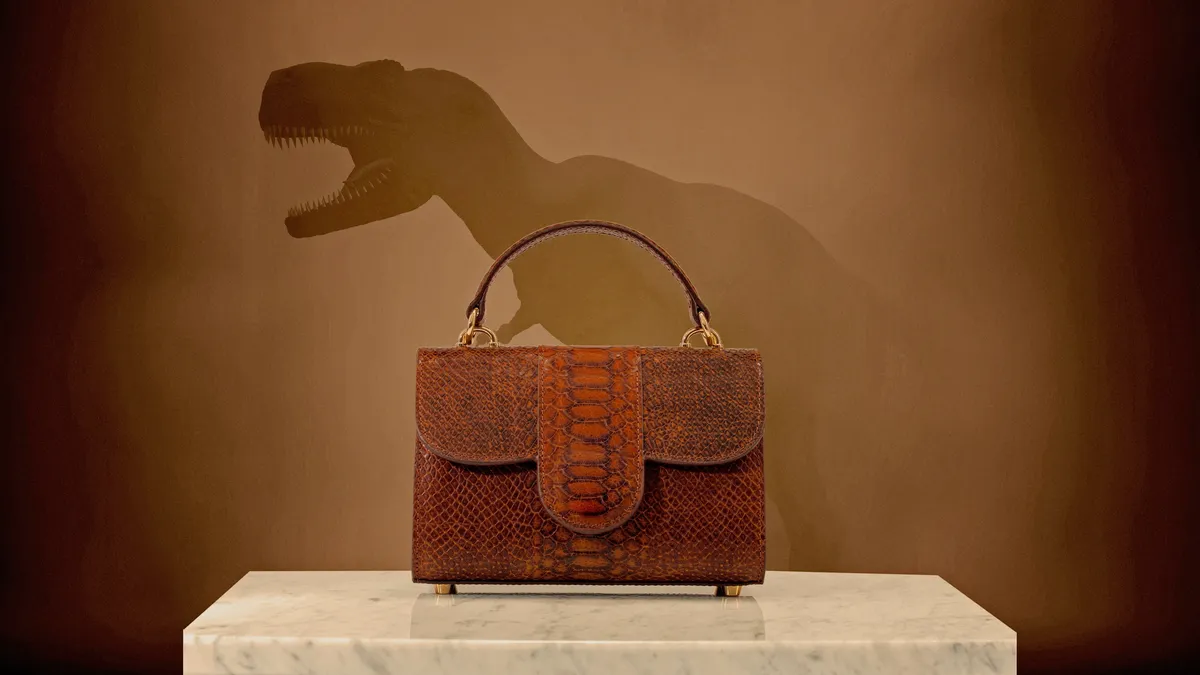
A groundbreaking partnership of companies has unveiled plans to create luxury fashion accessories using Tyrannosaurus rex leather. However, experts caution that this leather will not be derived from actual T. rex specimens. Instead, the innovative material will be produced in a laboratory, aiming to provide an eco-friendly and cruelty-free alternative to conventional leather.
The collaboration involves creative agency VML, along with biotechnology firms Lab-Grown Leather Ltd and The Organoid Company. According to a recent statement from VML, the new material will be based on fossilized T. rex collagen, a crucial protein that helps maintain the structure of skin and other tissues. The companies plan to engineer cells using synthetic DNA to create this unique material.
Despite the ambitious claims of the partnership, paleontologists have voiced significant skepticism. Experts point out that producing genuine T. rex leather would necessitate DNA from the extinct dinosaur, which has yet to be discovered. Notably, paleontologists have only located T. rex collagen in bones, not in skin, which is essential for leather production.
According to Thomas Holtz, Jr., a vertebrate paleontologist at the University of Maryland, the claims surrounding T. rex leather appear misleading. In an email to Live Science, he stated, “What this company is doing seems to be fantasy.” Efforts to contact VML for additional comment were unsuccessful.
DNA begins to deteriorate immediately after an animal's death. While some fragments may survive for millions of years, researchers have yet to uncover any DNA from the age of dinosaurs. The oldest preserved DNA on record, originating from an ancient Greenland ecosystem, dates back roughly 2 million years, whereas T. rex went extinct around 66 million years ago. Holtz emphasized, “We have NO preserved tyrannosaurid DNA... so there are no T. rex genes.”
Furthermore, Holtz noted the lack of quality tyrannosaurid skin samples, as soft tissues like skin are seldom preserved in the fossil record. Although there are a few impressions of tyrannosaurid skin, they do not provide insights into the internal tissue structure.
The upcoming T. rex-themed leather will utilize T. rex collagen, which has been identified in some fossil records. Previously, scientists believed that all organic material was destroyed during fossilization. However, advancements in research have revealed that collagen can be preserved through complex chemical processes, though not all collagen survives intact.
Experts like Thomas Carr, an associate professor of biology at Carthage College, have expressed skepticism about the feasibility of using T. rex collagen for this new material. Carr noted that the understanding of T. rex collagen is still incomplete, as fossilized polypeptides—chains of amino acids that form collagen—are often highly fragmented. He remarked, “There really isn't much of a template to work from that could accurately reconstruct a collagen molecule that is specific to T. rex.”
While Carr is doubtful about the T. rex leather concept, he acknowledges the importance of exploring lab-grown leather from an ethical standpoint. The partnership asserts that lab-grown leather can significantly lessen the environmental impact typically associated with traditional leather production, such as deforestation linked to cattle farming and the harmful chemicals used in the tanning process. Moreover, this innovative approach eliminates the need to kill animals.
Carr suggests that it may be more prudent to focus on sustainable leather options derived from living animals, like cows and crocodiles, rather than seeking inspiration from extinct species. He stated, “The notion of cruelty-free animal products is a legitimate ethical avenue to explore, so I don't think it needs any exotic 'prehistoric' twist.”
As the fashion industry increasingly seeks sustainable solutions, the development of lab-grown leather products remains a compelling topic that blends innovation with ethical considerations.